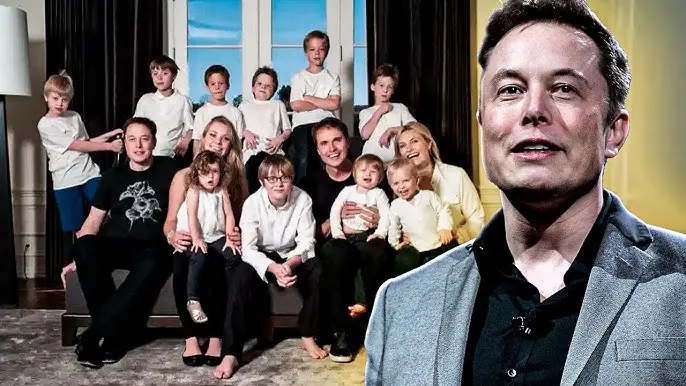Elon Musk, the enigmatic billionaire behind Tesla, SpaceX, and Neuralink, has never shied away from audacious goals. From colonizing Mars to merging human consciousness with artificial intelligence, his ventures aim to reshape humanity’s future. But a recent episode of the Pivot podcast, hosted by Kara Swisher and Scott Galloway, has spotlighted a particularly provocative ambition: Musk’s alleged obsession with creating a “legion of super babies” — a generation of “Mini-Musks” engineered to carry forward his intellectual and ideological legacy. This claim, rooted in Musk’s public statements and private endeavors, raises profound questions about his motivations, the ethics of his vision, and the societal implications of a world shaped by his progeny. Why is Musk, a father of at least 12 children, so fixated on this idea, and what does it reveal about his broader mission to redefine humanity?
The Genesis of Musk’s Vision

Musk’s interest in human reproduction is not new. Over the years, he has repeatedly voiced concerns about declining birth rates and the potential collapse of civilization due to underpopulation. In a 2021 tweet, he warned, “Population collapse is a much bigger problem than people realize,” urging people to have more children to sustain economic and cultural vitality. This stance aligns with his utilitarian worldview, where maximizing human potential is paramount. However, the Pivot podcast suggests Musk’s ambitions extend beyond encouraging higher birth rates to something far more personal: creating a lineage of individuals who inherit his intellect, ambition, and perhaps even his contrarian streak.
Musk’s large family — he has fathered children with singer Grimes, Neuralink executive Shivon Zilis and influencer Ashley St. Clair, among others — is often cited as evidence of his commitment to this cause. The Pivot episode, as referenced in a recent X post, frames this as an “obsession” with building a “legion” of super babies. While the term “Mini-Musks” may carry a satirical edge, it encapsulates Musk’s apparent desire to replicate his own traits in future generations, whether through natural reproduction or, potentially, technological interventions.
The Pro-Natalist Crusader
At the heart of Musk’s push for more children lies his pro-natalist ideology. He argues that declining birth rates in developed nations threaten economic stability, as aging populations strain pension systems and labor markets. In a 2022 interview, Musk projected that global population could peak by 2064, followed by a sharp decline if trends continue. His solution? Encourage high birth rates, starting with his own family. Musk’s 12 known children, including twins and triplets with Zilis, suggest he is leading by example.
Yet, Musk’s pro-natalism is not merely about numbers. The Pivot podcast hints at a qualitative dimension: Musk wants children who embody his vision of excellence. This aligns with his public admiration for polymaths and innovators, from Nikola Tesla to Tony Stark. By fathering numerous children, Musk may be attempting to increase the odds of producing heirs who can advance his technological and philosophical goals, such as interplanetary colonization or AI integration.
Critics, however, question whether Musk’s focus on his own progeny reflects an elitist mindset. Is he implying that only those with “superior” traits — like his own — should populate the future? The podcast’s framing of “super babies” suggests Musk may favor children with enhanced capabilities, possibly through selective parenting or, in the future, genetic engineering. This raises ethical red flags, as it echoes eugenics movements that sought to engineer “ideal” humans, often at the expense of diversity and equity.
The Technological Frontier: Engineering Mini-Musks
Musk’s companies provide clues about how he might pursue his vision of Mini-Musks. Neuralink, which aims to develop brain-computer interfaces, and The Boring Company, focused on infrastructure, may seem unrelated to reproduction. But Musk’s broader goal of augmenting human potential could intersect with reproductive technologies. Advances in CRISPR and genetic screening already allow parents to select embryos with desired traits, and Musk’s wealth and influence position him to access cutting-edge tools.
While there’s no concrete evidence Musk is actively pursuing genetic engineering for his children, his interest in transhumanism — the belief in enhancing humans through technology — suggests he might support such methods. In a 2020 podcast, Musk speculated about the potential of “designer babies,” where parents could choose traits like intelligence or resilience. The Pivot episode’s mention of “super babies” could imply Musk envisions a future where his offspring are not just numerous but optimized, perhaps with enhanced cognitive abilities to tackle the challenges of space exploration or AI governance.
This technological angle also ties to Musk’s concerns about artificial intelligence. He has warned that AI could surpass human intelligence, rendering humanity obsolete. By fostering a generation of intellectually superior Mini-Musks, he may hope to create a human vanguard capable of steering AI’s development. Yet, this vision risks exacerbating inequality, as access to genetic enhancements would likely be limited to the ultra-wealthy, creating a new caste of “superhumans” while marginalizing others.
The Psychological Drive: Ego or Altruism?
What drives Musk’s fixation on Mini-Musks? The Pivot podcast, as interpreted through online discussions, suggests a mix of ego and altruism. On one hand, Musk’s desire to replicate himself could stem from a belief in his own exceptionalism. His achievements — revolutionizing electric vehicles, space travel, and social media via X — may convince him that his genetic and intellectual legacy is uniquely valuable. Fathering a “legion” of children could be an extension of his need to leave an indelible mark on history, not just through companies but through bloodlines.
On the other hand, Musk frames his actions as altruistic. He argues that humanity’s survival depends on bold thinkers willing to challenge conventions, as he has done. By raising children who share his curiosity and tenacity, Musk may believe he is safeguarding civilization against existential threats, from climate change to asteroid impacts. His decision to name his children unconventional names like X Æ A-12 and Techno Mechanicus reflects this futurist ethos, signaling that his offspring are destined for a world beyond Earth.
Psychologists, however, caution against overinterpreting Musk’s motives. Dr. Emily Hart, a behavioral scientist, notes that high-achieving individuals often seek to extend their influence through family, a phenomenon dubbed “legacy fixation.” “Musk’s large family and public comments suggest he sees his children as extensions of his mission,” Hart says. “But this can place immense pressure on them to live up to an idealized image, which may not align with their own desires.”
The Societal Implications
Musk’s vision of a world populated by Mini-Musks has far-reaching implications. If he succeeds in raising a generation of brilliant innovators, humanity could benefit from accelerated technological progress. SpaceX’s Starship could ferry Mini-Musks to Mars, while Neuralink’s brain implants could enhance their problem-solving abilities. Yet, this utopian scenario assumes Musk’s children will share his values and priorities, which is far from guaranteed.
Moreover, Musk’s focus on his own lineage risks alienating those who don’t fit his mold. The Pivot podcast’s satirical tone, as echoed in online reactions, highlights public unease with Musk’s apparent self-aggrandizement. Social media posts on X mock the idea of “super babies,” with some users joking that Musk wants “an army of Elons” to dominate the future. This sentiment reflects broader concerns about concentrated power, as Musk’s wealth and influence already shape industries and policies.
Ethicists also warn of the slippery slope toward eugenics. Dr. Aisha Khan, a bioethicist, argues that Musk’s rhetoric about “superior” humans could normalize discriminatory practices. “If society prioritizes certain traits, like intelligence or ambition, it devalues those who don’t conform,” Khan says. “Musk’s vision could inadvertently fuel a culture of exclusion, where only the ‘best’ are deemed worthy.”
The Critics and the Faithful

Musk’s detractors argue that his obsession with Mini-Musks is a distraction from pressing issues. Tesla faces scrutiny over labor practices, while SpaceX’s environmental impact raises concerns. Critics like journalist Sarah Klein contend that Musk’s focus on procreation is a publicity stunt to deflect from these controversies. “He’s branding himself as humanity’s savior while ignoring real-world harm,” Klein writes in a recent op-ed.
Yet, Musk’s supporters view his vision as inspirational. Tech entrepreneur Vivek Rao praises Musk’s willingness to tackle taboo topics like population decline. “He’s not just talking about the future — he’s building it, one child at a time,” Rao says. On X, fans celebrate Musk’s unorthodox approach, with some calling him a “modern-day Noah” preparing humanity for a new era.
The Road Ahead
As Musk continues to expand his family and influence, the world watches with a mix of fascination and apprehension. The Pivot podcast’s exploration of his “super babies” may exaggerate for effect, but it underscores a truth: Musk’s ambitions transcend business and technology, reaching into the very fabric of human existence. Whether driven by ego, altruism, or both, his quest to create a world of Mini-Musks challenges us to confront uncomfortable questions about legacy, ethics, and the future of our species.
Will Musk’s children become the trailblazers he envisions, or will they rebel against the weight of his expectations? Can his vision of a thriving, innovative humanity coexist with principles of equality and diversity? Only time will tell. For now, Musk remains a polarizing figure — a visionary to some, a megalomaniac to others — whose every move shapes the contours of tomorrow.

